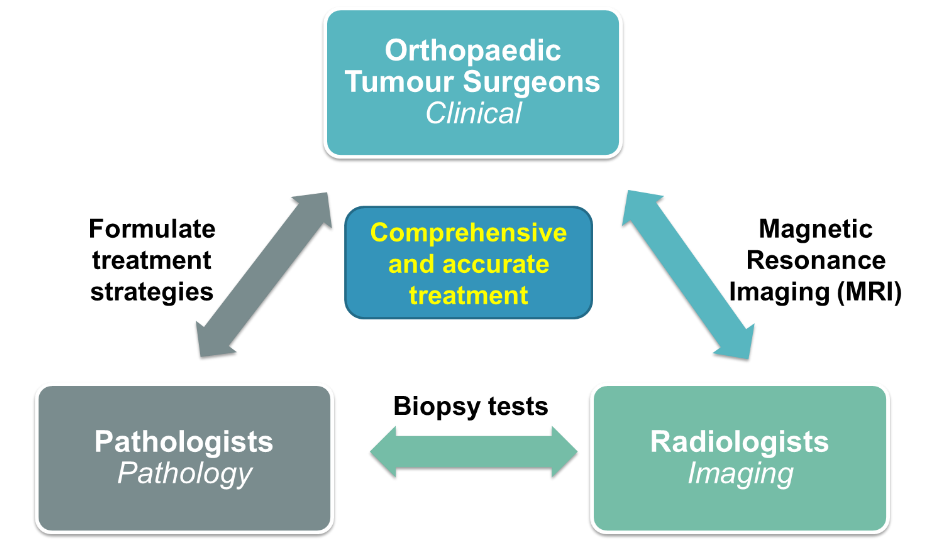Musculoskeletal Tumor Centre
The Musculoskeletal Tumor Centre provides comprehensive diagnosis and individualised treatment solutions to patients with musculoskeletal tumor. The Centre is complemented by a suite of facilities including:
- image scanning facilities such as ultrasound, Computerised Tomography (CT) scan; Magnetic Resonance Imaging (MRI), scintigraphy, positron emission tomography (PET);
- histopathology laboratory with immunohistochemical and molecular pathology capability;
- operation theatres well-equipped for complex surgeries including custom or modular megaprosthesis operations; and
- an oncology department that features brachytherapy, external radiation therapy, chemotherapy and immunotherapy to meet the needs of different patients.
Team-based and multi-disciplinary approach
Patients of the Centre are taken care of by a multidisciplinary team of sub-specialty experts including orthopaedic tumour surgeons, radiologists, pathologists, clinical oncologists, and anaesthesiologists, supported by orthopaedics nurses, rehabilitation therapists and professionals of other disciplines. The team-based, integrated approach adopted by the Centre allows accurate diagnosis, effective treatment plans, and optimal perioperative management and rehabilitation.

About Musculoskeletal Tumours
There are benign and malignant musculoskeletal tumours. Malignant musculoskeletal tumours are divided into primary and metastatic tumours, with primary malignant tumours (also known as sarcoma) further divided into two major categories: bone sarcomas and soft tissue sarcomas.
- Bone sarcomas: lesions arising in bone marrow, bone itself or adjacent periosteum.
- Soft tissue sarcomas: found in soft tissues, including fat, muscle and fibrous tissue etc. The causes of these tumours are still largely unclear, and they can be found in people of all ages, from the very young to the elderly.
Malignant musculoskeletal tumours (sarcomas) are not common, so the public’s awareness of it or alertness to symptoms is low. The number of new cases stays steady at about 250 per year, according to figures from the Hong Kong Cancer Registry of the Hospital Authority. Without proper image scanning and pathological examinations, the condition can be easily misdiagnosed. A hastily planned surgery without a concrete diagnosis also exposes the patient to unnecessary risks.
Common symptoms:
- Unknown lumps, pains, or walking problems
- Bone sarcomas:
- Characterised by pain and swelling around the tumour. Pains may be localised around the joints. They are mostly intermittent at first, and will then slowly grow persistent and stronger.
- The painful areas will swell, forming tender lumps that will increase in size, limiting joint activity, while muscles may shrink.
- If the tumour develops in the lower limbs, patients are more likely to have limping problems. As the condition worsens, joint effusion and pathological fractures could occur.
- Soft tissue sarcomas:
- Although the patient may have unexplained swelling or lumps, these are not necessarily painful or tender; the lump often grows rapidly in a short time.
- Only about half of patients with these lumps will feel pain; the remaining patients may have no pain at all.
People with the above symptoms should consider seeking medical advice for an early preliminary diagnosis.
Location: Clinic D, G/F, Tower A
Service hours: Every Wednesday, 10:00 a.m. – noon
Our specialists:
- Please view here for information
Consultation fees:
Initial/ Follow Up: HK$1,500 - HK$2,200
Remarks: The above charges refer to doctor consultation fees only and exclude fees for other procedures, medication, laboratory services, etc. The total charge is subject to the attending doctor's discretion and depends on individual patient's condition. Details of ancillary charges are available at the Admission and Cashier Counters.






